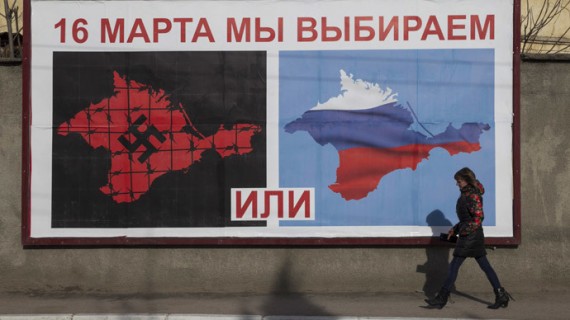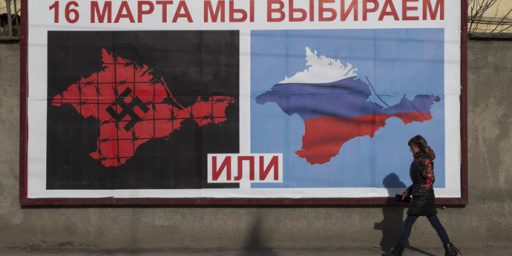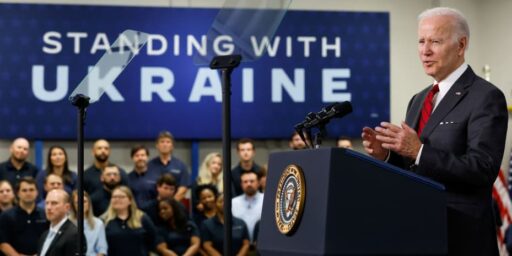Biden: U.S. Will Never Recognize Russian Annexation Of Crimea
Provocative words from Vice-President Biden. But, are they realistic?
Speaking at a press conference in Kiev today, Vice-President Joe Biden had strong language for Russia, and strong support for the Ukrainian government:
Kiev, Ukraine (CNN) – As the crisis in Ukraine shows no signs of easing, U.S. Vice President Joe Biden promised support for Ukraine and stressed that the United States won’t recognize Russia’s annexation of Crimea.
“Ukraine is and must remain one country,” he said in Kiev on Tuesday at a news conference with Prime Minister Arseniy Yatsenyuk. Biden also met with acting President Oleksandr Turchynov and lawmakers during his trip to Ukraine.
“No nation has the right to simply grab land from another nation,” Biden said. “We will never recognize Russia’s illegal occupation of Crimea.”
Biden called on Russia to “stop supporting men hiding behind masks and unmarked uniforms sowing unrest in eastern Ukraine.” He warned of additional sanctions if such “provocative behavior” does not end.
Ukrainian and U.S. officials say they think Russian special forces are in the region and are behind efforts to seize government buildings and generally promote unrest.
The U.S. vice president promised financial support, assistance in reducing Ukraine’s dependence on Russian energy sources and nonlethal aid for security forces.
“You will not walk this road alone. We will walk it with you,” Biden told Yatsenyuk.
Biden’s remarks are obviously intended to address two different situations.
The first is the on going crisis in eastern Ukraine in which pro-Russian militias, many of whom seem to be supplemented by personnel who look very much like Russian Special Forces, are laying siege to government buildings in cities such as Donetsk and demanding that the region be given a referendum to decide it’s political future. Some of these groups seem to be advocating independence from Ukraine, others are demanding more political autonomy within Ukraine, but the demands that are causing the most concern, obviously, are those demanding union with Russia, as happened in Crimea. These demands, combined with the political unrest and some 40,000 Russian troops near the border with Ukraine for what the Russians claim to be “military exercises” have raised tensions in the region and, as I noted last week, promoted NATO to respond both rhetorically and with announcements of small troop movements into Poland and Estonia. In this context, Biden’s tough rhetoric is both understandable and consistent with the policy that the West is putting forward with regard to the current events in eastern Ukraine.
Of more interest to me at least, though, is the second part of Biden’s statement that the United States would never recognize the Russian annexation of Crimea. As a rhetorical position, I suppose, it makes sense that the United States would say something like this (and when it comes from a Vice-President speaking in a foreign country, this should be taken as a formal statement of policy.) However, it doesn’t strike me as being a very realistic position. While there are some indications that the early transition to Russian rule has been chaotic to say the least, it seems highly unlikely that the Russians are going to give up what they have gained in Crimea no matter how the situation in eastern Ukraine unfolds. At some point, whether we like it or not, the United States will have to recognize the Russian annexation of Crimea as a fact.
The interesting question is how all of this will play with the Ukrainians. There are, obviously, going to be limits to how far the United States will be willing to go to support Ukraine even in connection with the current issues in eastern Ukraine and the Ukrainian government and people are likely not going to be entirely happy with how we respond to Russia’s actions here. Will they actually now also believe that we are going stand behind any effort on their part to regain control of Crimea from Russia? That isn’t going to happen, of course, and it strikes me that we really shouldn’t be getting the Ukrainians hopes up here by making a promise that we cannot possibly keep. Whether or not we like it, and whether or not the Ukrainians like it, Crimea is likely to be part of Russia for the foreseeable future. Creating the unrealistic expectation in the minds of Ukrainians that this might not be the case isn’t going to be at all helpful in resolving the many outstanding issues between Russia and Ukraine.







I think it’s worth pointing out that the flag of the Russian Federation, evoked in the poster above, is a version of the old Pan-Slavic flag as are the flags of most Slavic countries with the notable exception of Ukraine.
Assuming that Biden reflects the official US position…
Whats happening is that Biden is taking the extreme position- “Russia must give up Crimea!” – but in reality is willing to negotiate toward the middle (Russia keeps Crimea, but stays out of the rest of Ukraine). Had Biden said, “OK, we’ll let Russia keep Crimea”, Russia could take the position “Good, we’ll just pocket Crimea: time to negotiate about ‘Little Russia’.”
Another version of the Biden stance may be “Nothing is agreed to until EVERYTHING is agreed to, so we won’t concede Crimea until there is agreement on all of Ukraine”.
Maybe Obama has learned a little something about negotiation since he did unilateral concessions to Republicans in the hope that they would see he was negotiating in good faith, and reciprocate in kind . The repeated failure of that approach led him to give up that approach in domestic politics: he seems to have abandoned that approach in foreign piolicy too.
Now for this shocking, recent news: Putin is now saying that Russia is a Christian nation. He points out his own family history and that Russia is spending hundreds of millions of dollars to rebuild, modernize, and build new Christian churches. He also has been inviting and welcoming Christian leaders from the US to come to Russia. He is touting a new “reformation” . “Putin is firmly on the side of traditional Christianity” . Even some Christian leaders and pastors in this country are starting to talk about this. One pastor I heard on the radio the other Saturday even stated boldly that it was his belief that Moscow, not Rome, will be the new center of the Christian church. He also plans to take members of his church there in the near future. I was totally stunned, this coming from a very conservative church pastor.
Putin also seems to have dreams of the old Soviet Union. Which does he want? Maybe it will be the USCR (“Union of Soviet Christian Republics”). Unbelievable.
Negotiating with Russia: that is an oxymoron if I have ever seen one.
@Tyrell:
That’s an idea that goes back to the 14th century. It’s been a staple of Russian identity since then. Rather than put the citations here, I suggest you look it up under “Third Rome”.
IIRC Putin has been pushing this idea for at least the last 15 years, since before he took office.
As it works out your comment dovetails neatly with the point I suggested in my first comment. Putin is trying to put Russia forward not only as the champion of ethnic Russians everywhere but of Slavs everywhere and Orthodox Christians (if not all Christians) everywhere.
@Dave Schuler: Then the idea that he is trying to restore the Soviet “Union” is not totally accurate. Restore and some kind of union, maybe, but not what the USSR of Stalin, Kruschev, Brehznev, Kosygin.
Thanks for your information. I did not hear of this until a few weeks ago, and have not seen this mentioned on any news channel. I do not know if there are any books out about this or not. It seems that there would be some interest in some of the Orthodox churches here.
@Tyrell:
Yep, I think Putin’s model is maybe restoring the Russian Empire, which is a different thing from the Soviet Union.